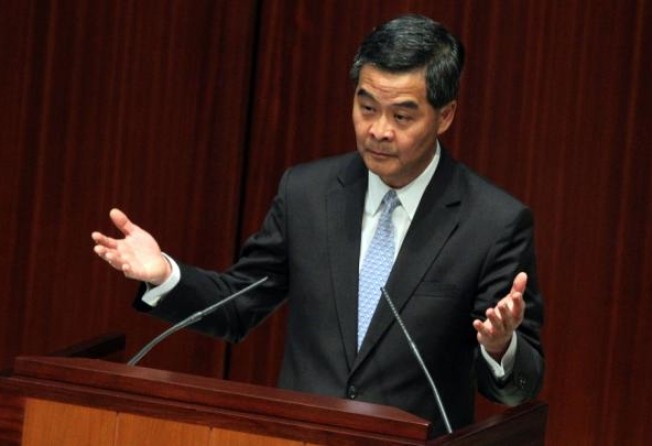Hong Kong is losing to Singapore as Pearl River Delta's role model
Despite warnings it is to Lion City, not southern neighbour, Guangzhou looks for urban renewal

Back in 2008, when he was Executive Council convenor, Leung Chun-ying warned that Hong Kong faced being marginalised in the mainland's rapid economic development.
Five years later, and now Hong Kong's Chief Executive, he has been presented with proof, with Hong Kong losing out to Singapore as a development model for the Pearl River Delta.
Guangzhou's city government announced one of its biggest urban renewal projects in years late last month, saying it would team up with CapitaLand, which is 40 per cent owned by Temasek, Singapore's state-owned investment company, to rebuild the city's Datansha Island, with total investment in the project of up to 28 billion yuan.
Local media reported that CapitaLand would be responsible for designing and rebuilding the 3.55 square kilometre island, in western Guangzhou. Other Singaporean companies would provide basic services to residents, including rubbish sorting and kindergartens. Guangzhou said it would make Datansha a "mini Singapore".
It was the second time in five years that Guangdong officials had revealed intense interest in the Singapore model. In 2010, they signed agreements with Temasek subsidiary Singbridge to jointly develop a new satellite town in the city's northeast over two decades.
The new town, Guangzhou Knowledge City, will be the third state-level Sino-Singapore co-operation project on the mainland, after the Suzhou Industrial Park in the 1990s and Tianjin Eco-city in the late 2000s.
It is no surprise that Singapore is wielding more influence on the mainland, with top leaders in Beijing long having admired and tried to learn from the model created by the political strongman Lee Kuan Yew.
The Datansha case shows that Hong Kong companies are losing out to Singaporean ones in their own backyard.
Challenges such as the global financial crisis of 2008 and Guangdong's introduction of policies to attract more hi-tech industries have shaken the foundations of the Pearl River Delta's Hong Kong-owned factories, most of which are small and medium-sized enterprises in low-end manufacturing industries.
The Federation of Hong Kong Industries warned last week that 10 per cent of the delta's Hong Kong-owned factories might move out of the region in the coming two years.
China opened up to global investors more than three decades ago. But only multinational giants and companies supported by state power, like those from Singapore, can gain the upper hand in competition with stronger local players and bargain with mainland governments.
Given the relatively small size of the average Hong Kong company engaged in the manufacturing or service industries north of the border, it is easy to imagine the difficulties they face. Many Hong Kong businessmen in the region urged their government to provide more support as early as the mid-2000s, when they realised that Pearl River Delta governmental departments would not care about small potatoes any more.
Compared to Singapore, Hong Kong's government failed to meet that challenge.
King-Lun Ngok, the vice-dean of Guangzhou's Sun Yat-sen University's school of government, said Hong Kong had lost its best chance to expand further on the mainland market years ago.
He said Hong Kong was supposed to be an ideal place to organise training courses for mainland civil servants, but it turned out many mainland cities had been sending cadres to Singapore to learn from its civil servants because Hong Kong was not enthusiastic about providing such training.
The Closer Economic Partnership Arrangement (Cepa), which grants Hong Kong firms preferential market access, was probably the biggest gift given by Beijing in a decade. In his policy address, Leung said he would promote Cepa to more mainland regions, as well as enhance co-operation with more provinces.
However, Leung should keep in mind that government also has a role to play in external markets, where Hongkongers are competing with investors from other countries or regions. That is the principle followed by Singapore's government, which has helped its companies gain more projects in the Pearl River Delta time and again.
Given Hong Kong's long battle with Singapore for the right to be regarded as Asia's bastion of free enterprise, it would be ironic if it end up facing another version of the Lion City right across the border.